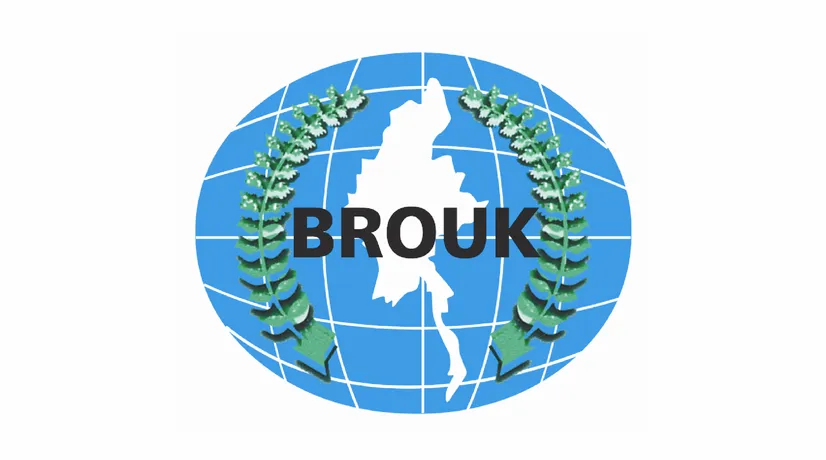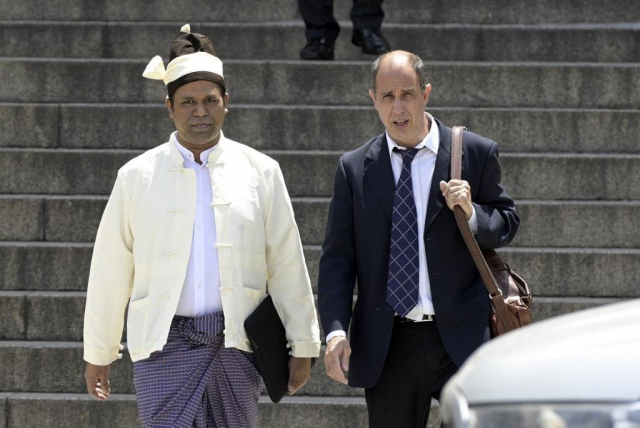Historic Decision By Argentinian Courts To Take Up Genocide Case Against Myanmar
28 November 2021


Media Release from Burmese Rohingya Organisation UK
The Argentinian judiciary has taken the historic step to open a court case against the Myanmar military – including Min Aung Hlaing and much of the current junta’s senior leadership – over the ongoing genocide against the Rohingya, the Burmese Rohingya Organisation UK (BROUK) said today.
On the 26 November 2021 the Second Chamber of the Federal Criminal Court in Buenos Aires confirmed that it would launch a case against senior Myanmar officials under the principle of universal jurisdiction, which holds that some crimes are so horrific that they can be tried anywhere. BROUK first petitioned the Argentinian judiciary to open such a case in November 2019.
“This is a day of hope not just for us Rohingya but for oppressed people everywhere. The decision in Argentina shows that there is nowhere to hide for those who commit genocide – the world stands firmly united against these abhorrent crimes,” said Tun Khin, President of BROUK.
The Second Chamber of the Appeal Court reaffirmed in its resolution that “the gravity of the facts and the violation of ius cogens norms permit that those facts are investigated in our country”.
“We applaud the Argentinian judiciary for showing the courage and moral leadership to take up this case. Justice for decades of dehumanising and killings of Rohingya in Myanmar is now within reach,” Tun Khin said, and continued:
“This is not just about accountability for Rohingya, however, but for everyone who has suffered under the Myanmar military’s brutal reign. This includes the thousands killed, injured, tortured or disappeared since the coup in February this year.”
An ongoing genocide
The case relates to crimes perpetrated against the Rohingya by Myanmar authorities in Rakhine State for decades. In 2017, the Myanmar military and its proxies launched a vicious campaign in the region, committing the worst atrocities and driving close to 800,000 Rohingya to flee across the border into Bangladesh. The case includes the particular situation of six women who were raped, tortured and in many cases their husbands and children killed during that genocidal campaign in Rakhine State.
The Rohingya who remain in Rakhine State continue to live under a dehumanising system of oppression where all aspects of their lives are controlled. Harsh restrictions on freedom of movement means that accessing education, health care and other basic services is difficult in the extreme.
In February 2021, the military seized power by force in Myanmar in a coup. Since then, close to 1,300 people have been killed and thousands have been jailed amid massive, nation-wide resistance to the junta. Although, for the moment, these events are not covered under BROUK’s case, the case does implicate much of the junta’s senior leadership, including Min Aung Hlaing, the Commander-in-Chief and self-proclaimed Prime Minister.
First universal jurisdiction case on the Rohingya
On 13 November 2019, BROUK petitioned Argentinean Courts to open an investigation into the role of Myanmar’s civilian and military leaders in committing genocide and crimes against humanity against the Rohingya. Under the principle of universal jurisdiction, such crimes can be investigated anywhere in the world regardless of where they were committed.
Since November 2019, the Argentinian judiciary has maintained a dialogue with the International Criminal Court (ICC) to ensure that a universal jurisdiction case would complement – and not duplicate – the ICC case against Myanmar launched in November 2019.
The case in Argentina will cover the full range of crimes committed against the Rohingya in Myanmar, unlike the ICC case which is limited to only crimes which have at least partially been committed on Bangladeshi territory.
Having received such assurances, the judiciary yesterday confirmed it would take up the case. This will be the first universal jurisdiction case related to the situation of the Rohingya anywhere in the world.
“For decades, Myanmar officials have with impunity tried to wipe the Rohingya out as a people. Justice is the only way to break the cycle of violence, and with Myanmar both unwilling and unable to investigate itself, the international community must step in,” said Tun Khin. “This universal jurisdiction case in Argentina shows that accountability is possible. We urge other countries to immediately explore opening similar cases to show those responsible for the genocide that there are no safe havens anywhere.”
“This is a real chance to hold the Myanmar military and its supporters to account for their murderous actions, including Min Aung Hlaing, who is the chief architect of both the Rohingya genocide and the coup that has brought so much suffering to Myanmar. The military is the common enemy of all people of our country”, Tun Khin said.
BROUK is supported in Argentina by the human rights NGOs Grandmothers of the Plaza de Mayo and Foundation for Peace and Justice, founded by the Nobel Peace Prize Winner Adolfo Pérez Esquivel. BROUK is legally represented by Tomás Ojea Quintana, a prominent human rights lawyer and the former United Nations Special Rapporteur on the situation of human rights in Myanmar (2008-2014).
Moving forward
Investigations by BROUK’s legal team will begin immediately, which will focus on identifying perpetrators of abuses, both those who committed the actual crimes and those with command responsibility. If those responsible refuse to heed summons to attend Court hearings in Argentina, BROUK will reach out to international criminal justice bodies such as Interpol with a view to issue arrest warrants.
A key part of the process will be to ensure that Rohingya victims themselves are able to testify in Argentina, in particular the six women who are part of the case. Not only is this important to demonstrate the scale of abuses by the Myanmar military, but it also speaks to the rights of victims to be heard and to tell their stories in a Court of Law.
BROUK will furthermore ask that the Court requests information from social media companies, in particular Facebook, regarding hate speech spread on their platforms that could have contributed to a hostile environment against the Rohingya.
In addition, the Independent Investigative Mechanism for Myanmar – established by the UN in 2018 to gather evidence of gross human rights violations – has offered to the Court its formal support for BROUK’s case, including through the sharing of relevant evidence.
International justice efforts
The case in Argentina is the first universal jurisdiction case concerning the Rohingya genocide anywhere in the world, but not the only international legal process against the Myanmar authorities.
As mentioned above, the ICC in November 2019 approved an investigation into Myanmar for crimes against humanity against the Rohingya.
The Gambia in November 2019 launched a case against Myanmar for violating the Genocide Convention with the International Court of Justice (ICJ). In January 2020, the ICJ imposed “provisional measures” on Myanmar as part of the case, essentially a legal injunction ordering the end to genocidal practices against the Rohingya.
“There is no question that the Myanmar authorities are feeling the pressure of the many international justice efforts that are under way. The architects of the genocide against the Rohingya can and should soon face a Court of Law. We urge the international community to redouble efforts to bring about justice and ensure that this momentum is not lost,” said Tun Khin.
About universal jurisdiction
Universal jurisdiction is based on the principle that some crimes are so horrific that they concern humanity as a whole, and can be tried anywhere regardless of where they have been committed. All states are permitted to exercise universal jurisdiction over crimes under international law, such as crimes against humanity or genocide.
This allows for the ability to investigate and prosecute individuals suspected of responsibility for war crimes and crimes against humanity, torture, genocide, and enforced disappearances, regardless of where the crime was committed or the nationality of the suspect or victim.
The principle of universal jurisdiction is also enshrined in the Argentinean national legal framework, including in article 118 of the Constitution.
In the particular case of the Rohingya, UN bodies, including the Fact-Finding Mission on Myanmar, have recommended that states pursue universal jurisdiction cases.
For more information, please contact Tun Khin on +44 7888714866
Announcements
21 May 2025
Open letter: Malaysia must lead ASEAN with principle, not hypocrisy, to address the Myanmar crisis

Progressive Voice is a participatory rights-based policy research and advocacy organization rooted in civil society, that maintains strong networks and relationships with grassroots organizations and community-based organizations throughout Myanmar. It acts as a bridge to the international community and international policymakers by amplifying voices from the ground, and advocating for a rights-based policy narrative.